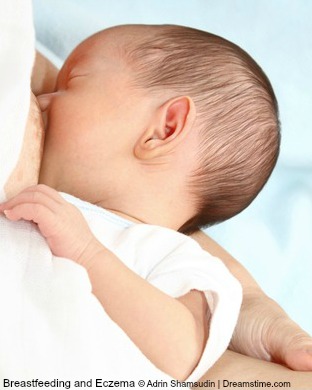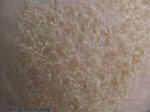Is There A Link Between Breastfeeding and Eczema?
If you’re expecting or if you’re a new mum, the link between breastfeeding and eczema may have been something you’ve thought about.
A couple of the questions that get asked are:
- Does breastfeeding cause eczema?
- Can breastfeeding prevent eczema?

Different research has come up with differing views on whether there is a link between breastfeeding and eczema.
I’m going to share with you what I’ve found.
Hopefully it will help you to come to your own decision about if you'll breastfeed or bottle-feed.
Breastfeed or Bottle-feed?
Breast milk and most formula milk both contain the proteins whey and casein. These proteins make it easier for your baby to digest the milk.
One benefit of formula milk is that it is made to contain all of the nutrients that a growing baby needs. The production of formula milk is regulated to make sure that it contains these nutrients.
Breast milk can also contain all of the nutrients that are needed. Although the amount passed in the milk can be dependent on the amount of vitamins and minerals that the mum consumes or takes in.
The reason that some babies may start developing the symptoms of eczema when they drink formula milk is because of the cow’s milk protein that it contains.
There are a number of reasons why some experts say that babies should only be breastfed from birth to 4 to 6 months:
- If a baby is only fed breast milk, then they aren’t exposed to cow’s milk. This means that there is less chance of an allergy developing
- A baby’s immune system isn’t fully developed until around 6 months. This is when they start producing the right defences to fight foreign substances. Their system isn’t ready for anything other than their mum’s milk. They also get antibodies from breast milk
- When a baby is first breastfed the first milk they receive, known as colostrum, is rich in antibodies. One of these antibodies, IgA, coats the inside of the intestines with a protective layer. This layer can help prevent allergies from entering the intestine.
The main reasons given by researchers about why mums should only breastfeed for at least the first 4 months, are to do with the development of allergies.
These are all valid reasons.
Something to take into account when making the decision how to feed your baby, is that babies are born with differing risks of developing allergies.
If there is a family history of atopic disease, which includes eczema, asthma and hayfever, then you may feel that it would be beneficial to breastfeed for the first 4 to 6 months.
You may decide that you don’t want to breastfeed, or you may find that you’re unable to. There has been some research that shows that there is no link between breastfeeding and eczema, and that it doesn’t lower the risk of allergies developing.
In one study it was found that introducing food proteins, that are known allergens for some people, early in a baby’s life can help increase their tolerance to them. This means that an allergy is less likely to develop.
If any eczema symptoms appear, or any other signs of an allergy, even if it’s just dry skin or redness, then you could try a different brand of formula. Another option is to try a soy version of formula milk which doesn’t contain the cow’s milk protein.
Is Breastfeeding Good For Your Eczema?
If you already suffer from eczema, then there is a higher risk of you developing nipple eczema whilst breastfeeding.
The main reasons are because the skin on and around the nipple can be become cracked and dry. Your baby’s saliva can also irritate the skin, leaving it feeling dry, itchy and sore.
In between breastfeeding keep the nipples and surrounding areas moisturised, using an emollient that is as natural as possible. Also try to stick to wearing cotton bras, as other materials may irritate your eczema.
What you eat is important for your eczema if you have any common food allergies. It can also be important for your baby. Breast milk not only passes nutrients to your baby, it can also pass allergens to them.
Before you decide to cut out certain foods from your diet please speak to your doctor first. They would want to make sure that you are getting everything you need for you and your baby’s health.
I am the eldest of three children in my family. I developed eczema at a very early age. Neither of my 2 sisters have ever had eczema, and we were all bottle fed. I’ve wondered if being bottle fed made a difference for me. Or if I was just born being more at risk of developing eczema, and that it would have happened whether I was breast fed or given formula milk.
There seems to be no definite right answer for what is the best way to feed your baby and what the link is between breastfeeding and eczema. But I hope that this has helped to answer some of the questions that you had. If you’d like to share your thoughts and experiences of this, then I’d love to hear from you.
Return from Breastfeeding and Eczema to Baby Eczema
Return from Breastfeeding and Eczema to What Is Eczema Home
Search What Is Eczema?
Advertising on What Is Eczema?
We are a participant in the Amazon Services LLC Associates Program, an affiliate program which allows sites to earn fees by advertising and linking to amazon.com. If you make a purchase through a link on this page, I may receive a small commission, at no extra cost to you. Many thanks
